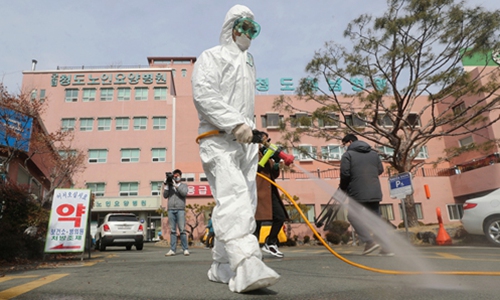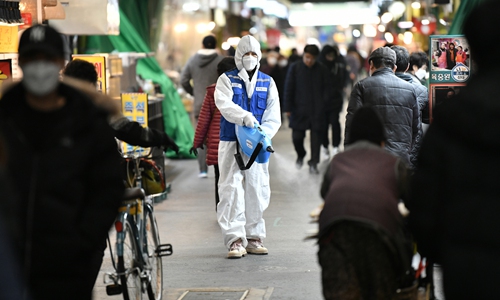HOME >> CHINA
Rising COVID-19 cases in South Korea scare away shoppers, tourists from China
By Liu Caiyu and Wan Lin Source:Global Times Published: 2020/2/24 18:53:40

A South Korean health official sprays disinfectant in front of a hospital where a total of 16 infections of COVID-19 have been reported, in Cheongdo county near the city of Daegu on Friday. The total number of infections in South Korea rose to 602 as of 10 pm Sunday. Photo: AFP
The deteriorating epidemic situation in South Korea has scared away shoppers and tourists and worried Chinese students after the country reported 833 confirmed cases of coronavirus infection and eight deaths as of Monday night.
Crystal, a Chinese shopper based in Langfang, North China's Hebei Province who has been a professional purchasing agent for years, told the Global Times the emerging epidemic in South Korea has ended the job.
"I usually go to South Korea once a month to buy cosmetics but this annoying coronavirus kept us home. My current stocks would be sold out in days," Crystal said, noting the purchases from South Korea would earn her about 20,000 yuan ($2,844) every month.
The coronavirus hit the outbound professional purchasing business hard and many have switched to other businesses, Crystal said. "We cannot go out of China right now and I'm also scared to get infected in South Korea," another shopping agent said.
The flights between China and South Korea have been significantly reduced due to the impact of the epidemic. Air carriers including Korean Air have called off flights to Wuhan and reduced flights to other Chinese cities untill March, the Yonhap News Agency reported.
Outbound tourism to South Korea has seen a sharp drop due to the impact of the coronavirus and the group-travel suspension by the China Association of Travel Services in January, industry experts told the Global Times.
Travel agents have stayed at home for weeks as no overseas group tours are allowed. Individual tourism to South Korea also has largely dropped as the epidemic in the country worsens, a tourism agent based in Beijing surnamed Wang told the Global Times.
Outbound tourism is expected to recover in the latter half of the year, she said.

A worker from the Korea Pest Control Association, wearing protective gear, sprays disinfectant to help prevent the spread of the COVID-19 at a market in Seoul, South Korea on Monday. Photo: AFP
The epidemic clearly affected Chinese students studying in the neighboring nation as well. A junior student at Sangmyung University in Seoul, surnamed Liu, told the Global Times on Monday that her school has asked Chinese students to complete a 14-day quarantine before class starts on March 16, which means she has to set off before March 1.
"My family and I are considering if I need to apply for a suspension for the next quarter, and for that I have to wait for a few more days to see how serious the whole epidemic situation is in South Korea," said Liu.
The South Korean Ministry of Education advised Chinese students who have not yet bought air tickets to South Korea to suspend their studies this semester and promised to relax credit restrictions for these students through measures such as the centralized study system.
More than 38,000 of the 70,000 Chinese students studying in South Korea's universities have yet to enter the country, with 19,000 expected to do so in the next two weeks, according to the ministry.
From Sunday night, the airport in Yanji, Northeast China's Jilin Province strengthened its precautionary measures on inspection of flights from South Korea. Flights from South Korea will go through designated channels and will be isolated from domestic flights.
Yanji airport has an average of two South Korean flights every day, with an average of 350 passengers per day.
After the tighter measures on flights from South Korea were issued in Yanji, Chinese residents from Shandong Province, one of the provinces that has the most frequent contacts with South Korea, called for the local government to impose similar entry restrictions on passengers from South Korea, to prevent the spread of the virus.